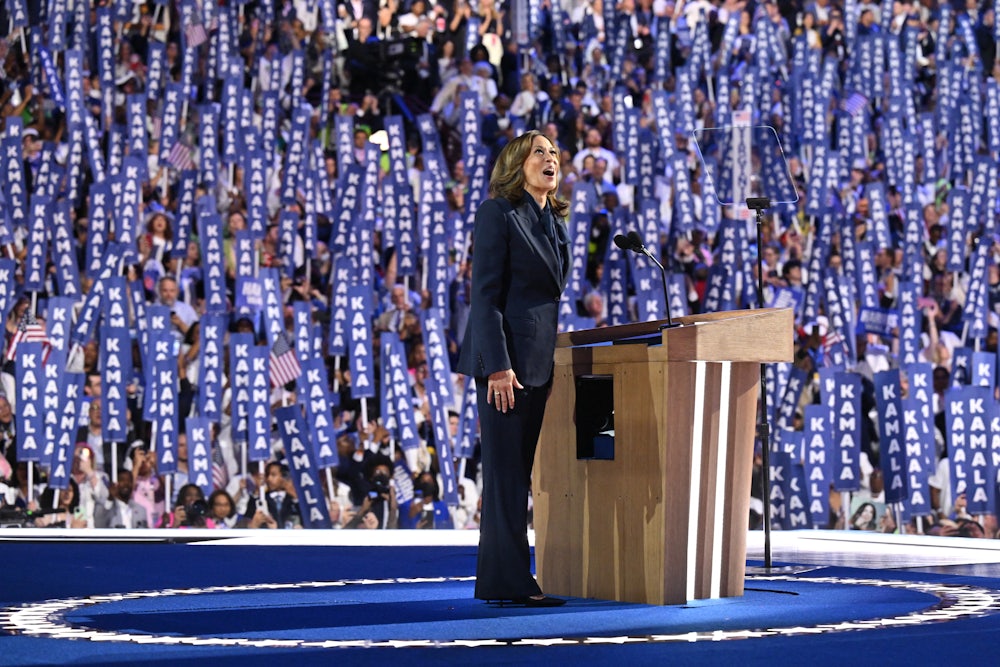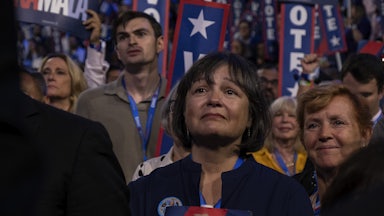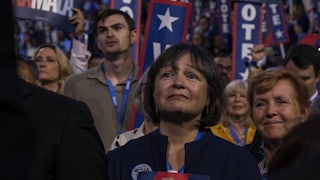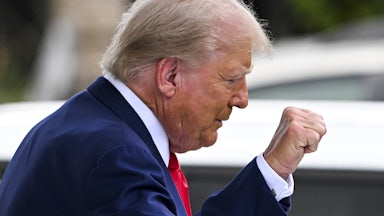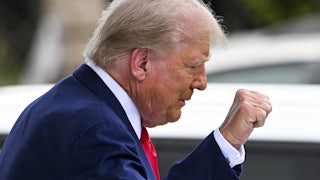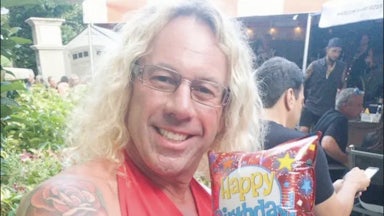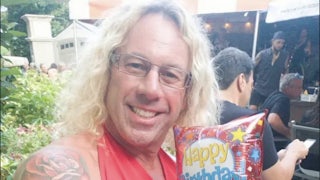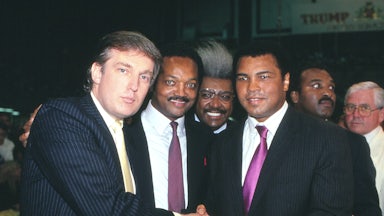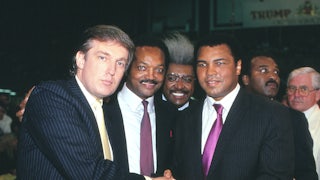A party convention is no fit place for the nonbelievers, or even the agnostic. While the delegates, on hand to cast the votes that seal the presidential nomination, are not typically elected officials, they are not exactly on par with the average American in terms of political knowledge or engagement. Like a weeklong music festival or religious holiday, these affairs cater to the faithful. And lo, at this party, the diehards were rewarded for their devotion with appearances from celebrities, a myriad of mostly unremarkable political speeches, and—thanks to a passing of the torch that few imagined would happen when this presidential campaign began—a new confidence in their party’s electoral chances in November.
The atmosphere of the Democratic National Convention this week went beyond mere enthusiasm—it ventured on rapturous. Attendees spoke of the overwhelming “joy” of the occasion—a term that has been adopted by Harris and her supporters. At times, the affair resembled a megachurch worship service, with political sermons and musical performances regularly bringing the crowd to their feet. (At some points, actual preachers did take the stage, such as Senator Raphael Warnock and Reverend Al Sharpton.)
To some, it was more like a music festival. As one viral tweet posited, “the DNC is just Coachella for Poli-Sci majors.” The star power of the DNC threatened to outshine the lights of the United Center, the sports arena and concert venue that hosted the evening events. Musicians like John Legend, Pink, and Stevie Wonder performed, while celebrities such as Lil Jon and Eva Longoria participated in the roll call of states announcing their support for Harris. Oprah Winfrey made a surprise appearance, replicating an iconic meme in her support for “Kamalaaaa Haaaarris!” When Harris herself took the stage on Thursday, the already deafening cheers of the crowd verged on earsplitting—as she accepted the nomination, the decibel level was almost painful. Attendees who had been unable to find space in the arena watched from just outside the doors, trying to sneak a peek at the nominee.
Deon Canon, a 27-year-old delegate from Wisconsin, compared his experience at the DNC to another gathering of the faithful that he attended two years ago: Anime Midwest, the annual convention for anime fans held in Chicago. “It was just excitement. People wearing their shirts; people happy just to be there, just to be in that space, going to different panels, going to the different events,” recalled Canon. “It surprised me how similar [the DNC] was to an anime convention, just with less anime.” Maybe in 2028!
Early in the evening on the fourth night of the convention, the convention floor was closed off to reporters due to overcrowding. The floor party was for the believers, not for the journalists covering it, hundreds of whom were relegated to nosebleed seats at the top of the arena to gaze upon the festivities below. In between speeches on Thursday, a D.J. would play basic wedding reception standards, such as “I Gotta Feeling” by the Black Eyed Peas and “Shake It Off” by Taylor Swift.
Representative Mikie Sherrill of New Jersey compared the vibe of the convention to that of a bachelor party. “You’re with this big group of people, and you keep doing all these events,” Sherrill explained. “It feels like you’re going to all these party things with the same people, like a bachelor party, and then you’re up half the night, and then you get up in the morning real early—”
She took a beat to consider. “Maybe not like a bachelor party.”
Perhaps something a skosh more sedate: She described going to an after-party on Wednesday evening with colleagues from Congress and members of the New Jersey delegation. “It felt like I had gone off to college in D.C. from New Jersey, and I was bringing my friends back and introducing them to my family,” Sherrill said with a laugh.
Late night events are a key aspect of the convention ecosystem; attendees could level up their see-and-be-seen game if they got invited to the party after the party. The artists that made appearances at the convention would frequently pop up later at postconvention events, where they would be mobbed by partygoers excited to see real celebrities amid all the run-of-the-mill political ones.
Harris essentially sewed up the nomination as soon as she was endorsed by Biden roughly 20 minutes after he announced the end of his reelection bid. As such, the convention is largely unified behind her, with that unity undergirded by no small amount of relief that Biden is no longer the nominee.
“The vibes [in] 2024 are insane. The unity, energy and excitement are unlike anything I’ve seen since 2008. 2016 was amazing, but this is on a different level,” said one Democratic delegate who has attended multiple conventions.
The clubby, giddy vibe of the 2024 convention contrasted heavily with the two most recent Democratic presidential crowning ceremonies. In 2020, the “convention” was largely held virtually, due to to the coronavirus pandemic. And while 2016 had the historic distinction of being the first convention to nominate a woman candidate in former Secretary of State Hillary Clinton, the excitement of the occasion was occluded by lingering resentment over a bitter primary fight with Senator Bernie Sanders. Whereas President Joe Biden essentially coasted through the 2024 primaries before he dropped out of the race, Sanders mounted a campaign that earned him several delegates at the 2016 convention, who were not necessarily gung ho about Clinton.
That conflict, however, is a mostly forgotten spat from a more innocent era. While the enthusiasm for Harris was significant, it was not universal. There was a significant split-screen effect on the ground, between the thousands of eager supporters inside the arena, and the angry dozens seated outside. Supporters of the “Uncommitted” movement, who have attempted to use what electoral leverage they have to force the Biden administration to broker a permanent cease-fire in Gaza, held an impromptu sit-in outside of the United Center on Wednesday evening and throughout Thursday in protest of the decision by the national committee to not to allow a Palestinian American speaker to deliver remarks. Their sense of alienation could be seen just a few feet outside of the arena. “We would love nothing more than to be inside celebrating the politics of joy, but not everyone was included,” said Jeremiah Ellison, a city council member in Minnesota.
Georgia state Representative Ruwa Romman, a Palestinian American lawmaker who had prepared remarks to deliver before the convention, told me on Tuesday that Harris needed to prove she heard the concerns of young voters and voters who are concerned about the U.S. approving weapons transfers to Israel. “Our job as a party is to show people that we’re not just asking them for their vote and then leaving them behind. We’re asking them for their vote for the express purpose of getting to the policies that they are looking for,” Romman told me on Tuesday.
Roman Fritz, a 19-year-old delegate from Wisconsin, said that he was disappointed by the apparent lack of interest in the plight of Palestinians by the Democrats at the convention. By not allowing a Palestinian American speaker on the stage, particularly after the parents of an Israeli hostage taken by Hamas spoke on Wednesday, the party shows it “values some lives more than others,” he argued.
“It’s sending the wrong message to voters. It’s sending the wrong message to young people like me and progressives like me,” Fritz said. Harris did acknowledge the conflict in her speech, saying that she and Biden are “working to end this war to secure the hostages are released, the suffering in Gaza ends, and the Palestinian people can realize their right to dignity, security, freedom, and self-determination.”
While the excitement felt by Democrats at the arena was “partially justified” because of Biden’s self-removal from the race, Fritz continued, he also argued that the delegates were not actually representative of the average American’s experiences. “I think a lot of these people are incredibly out of touch,” Fritz said, noting that convention attendees from out of town generally had the money to spend on a week in a hotel. “It’s people who can afford a $2,500 hotel who are deciding the Democratic nominee for president.”
When the party, and the after-parties, are over, the jazzed Democratic delegates and lawmakers at the convention will return to their home states, and to the task of maintaining momentum for the next 70-odd days. Kimberly Eaton, a delegate from Oklahoma wearing a white suit, a bedazzled blue cowboy hat, and American flag nails, was not worried about keeping up the energy: “Back home, it’s already hot,” she said.
“The momentum is real, and it’s going to be even once we get back,” said Eaton. “Either you want doom and gloom, or you want peace and joy.”
Preaching to the already converted is an important element of campaigning, particularly in an election where the margins of turnout in a collection of swing states could determine the outcome. But much like Star Wars fans leaving the hallowed Hall H of San Diego Comic-Con, Democratic convention-goers are going home to neighbors who don’t necessarily share their passion or interest. The DNC attempted to cater to these voters, with appearances from some former Republican lawmakers and officials.
These allegedly persuadable voters are the Americans who probably couldn’t be convinced to spend four days listening to speeches in a crowded basketball stadium—but who might be the very people Kamala Harris needs to turn out in November. “I promise to be a president for all Americans,” Harris said in her speech accepting the nomination, vowing to be “a president who unites us around our highest aspirations.” She spoke of the “privilege and the pride of being an American,” a phrase that would not be out of place at a Trump rally.
It was a convention clearly by and for Democrats, ending with a pledge to reach beyond; there are just over two months for Harris to convince voters of that promise.
